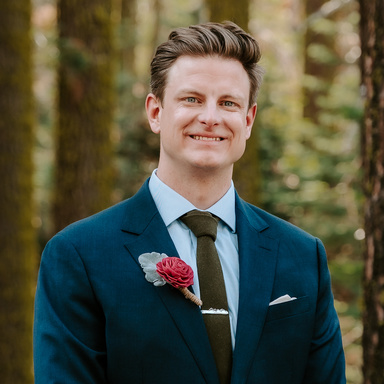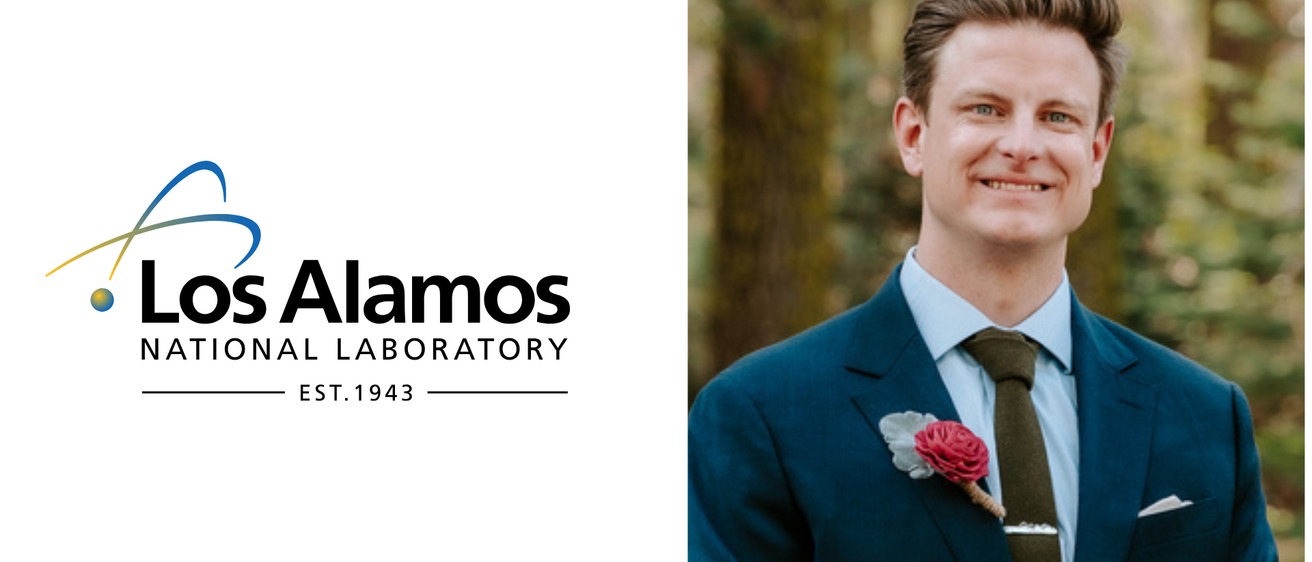
Geoffrey Fairchild (PhD '14) recently agreed to a follow-up Q&A to his 2015 Alumni Profile piece here. Still at Los Alamos National Laboratory (LANL) but in a new role as Group Leader, he shares insightful updates, advice, and more!
When we contacted you in 2015 you had recently defended your thesis, transitioned from being a Grad RA at Iowa and LANL to a Scientist role at the latter. Where has your career and research taken you since then?
It’s been such a fun journey since then! I’m still at LANL and just celebrated my 11-year anniversary. Since 2015, I’ve spent my career focused on a variety of projects that can generally be grouped into “applied advanced data science for national and global security”. I’ve continued work in the realm of disease modeling (the COVID-19 period was wild!) and have also spent significant time exploring other important areas including information dynamics, political instability, patterns of life analysis, and more. Since mid-2020, I’ve also served as a part-time science advisor at U.S. Strategic Command in Omaha, which has been one of the highlights of my career.
As of a few months ago, I took on a new role as a Group Leader, where I supervise the day-to-day operations of nearly 40 staff scientists and another 40-50 students and postdocs. I was admittedly a bit nervous about making the change from science into management (especially jumping into the deep end where I’m supervising nearly 100 people!), but I’ve come to really enjoy it. I get to help set my Group’s strategy and direction, and I continually interact with a lot of killer scientists, so it’s not as much of a departure as I initially thought it might be. I’m firmly an extroverted people-person that loves enabling those around me to succeed, so this is a really fulfilling role for me.
You have mentored students, postdocs, and early-career staff: any advice for 1) our PhD students 2) undergrad and MCS students on the fence about undergrad research or pursuing a PhD?
I’ve mentored over 30 students and postdocs during my time at LANL, and early on, I realized that mentoring is one of my favorite aspects of the job. I do have a few bits of advice:
- Undergrad and MCS students
- If you’re trying to figure out if a Ph.D. is for you, go do an internship at a place that does research. I’m biased towards national labs, but they really are some of the best places to try out research as a student. The Department of Energy (DOE) has the most notable national labs, but the Department of Defense has a bunch of great ones as well (Army Research Lab, Naval Research Lab, Air Force Research Lab, etc.). Depending on your interests, you might also consider internships in the Intelligence Community (CIA, NSA, NGA, etc.) or other parts of the federal government. I’ve worked with so many students over the years that came here in the immediate aftermath of their B.S. degree precisely to figure out if research (and ultimately a Ph.D.) was right for them; LANL offers 2-year post-baccalaureate internships that are ideal for trying out research without committing.
- If you’re more interested in industry, all the big names (Google, Amazon, Apple, Microsoft, etc.) and many of the smaller names will offer internships as well. I certainly recognize my bias, but one bit of advice when considering industry internships is to consider the mission. For me, for example, contributing to national security is much more meaningful than building a better model for serving ads, which is why I gravitated much more strongly towards LANL, but your motivations may be different than mine.
- Ph.D. students – I’ve got 2 bits of advice:
- A Ph.D. is a slog. I don’t mean this in a bad way at all, but it takes a lot of time and will power, and there will be times when your motivation is waning. The best bit of advice I have is to treat a Ph.D. like a job. Work Monday through Friday from 9am-5pm (or whatever works for you). Having a regular schedule with regular days off will discourage you from working around the clock, and it gives you time for a break. Take vacations! A weekend in Chicago or Minneapolis is easy and will help clear your mind, allowing you to return fresh. Obviously, you’ll need to work the occasional weekend, but if you’re fooling yourself into thinking that you need to work around the clock continuously to make progress, you’re going to burn out, and your work will suffer. It’s counterintuitive, but time off will make you more effective over the long haul. Effective time management and prioritization is crucial for this.
- Internships aren’t only for undergrads and MCS students! I started at LANL as a summer intern after I completed the 4th year of my Ph.D., and it turned into an 11-year career. An internship can help you figure out what you want to do after graduation, and it can actually help you lock down a job before you graduate. I was personally leaning towards industry prior to discovering the national labs, and I’m so glad that I discovered what a national lab offers because it’s so much more fulfilling for me than industry would’ve been.
Similarly, what is your perspective on achieving early but also continued success in a computer science career?
For early achievement, my best bit of advice is to say “Yes!” to most opportunities thrown your way. This is how I’ve succeeded in my career. Saying yes enables you to meet new people and try out things that you might otherwise not have tried. Now, there’s obviously a balance here because you can’t say yes to too many things and risk overwhelming yourself, but in my experience and through the experience of most early-career staff members that I’ve helped mentor, saying “Yes!” wantonly naturally works out so that you’re not at risk of overwhelming yourself until you’re 3-5 years into your career, when you’re a bit more established and can start being more strategic with your yesses.
In that 2015 profile, you mentioned that you’d “spent significant time working with a large-scale agent-based simulation of human movement and disease spread to understand potential mitigations during an epidemic or pandemic (e.g., wearing face masks, closing schools).” How important was your background with regards to COVID-19 research at Los Alamos?
It was crucial! LANL, as a whole, has decades of high-fidelity disease modeling experience, and without this existing experience, there’s no way we could’ve accomplished what we did. During the peak of the COVID-19 pandemic, I was working on several exciting modeling efforts. As we all know now, face mask usage and school (and work) closures were some of the more hot-topic issues, and being able to build robust models to help make quantitative sense of things was critical; we worked directly with the CDC, New Mexico Department of Health (NMDOH), and several school districts in large cities from around the U.S. to model and inform school reopening scenarios as the initial vaccines were being released in early 2021. I also led the development of the nightly model pipeline on our supercomputers and public-facing website for our global COVID-19 forecasting model; our forecasting model, which went live in early April 2020, was the 4th model published on the CDC’s COVID-19 forecasting hub (there are now hundreds) during a time in which decision-makers were information-starved. It was such a meaningful experience to work directly with CDC, WHO, and NMDOH officials, especially in those early days.
For additional alumni/ae recollections of their time at Iowa, click here!
What's New... with you? We’d love to hear from you! You may use this form to notify CS staff and chair of awards for research work; notable publications (e.g., "Best Paper"); and other academic, career, or research-related achievements.
